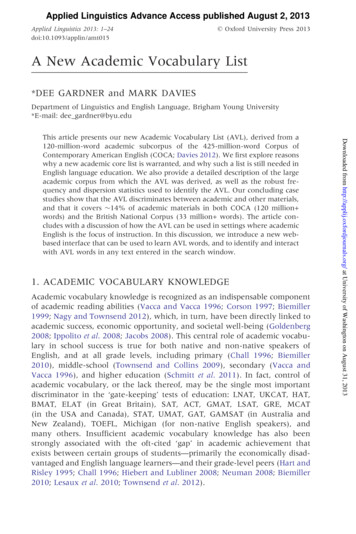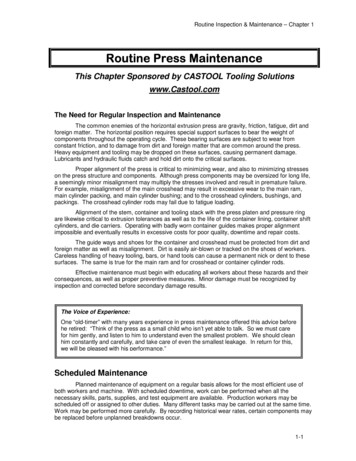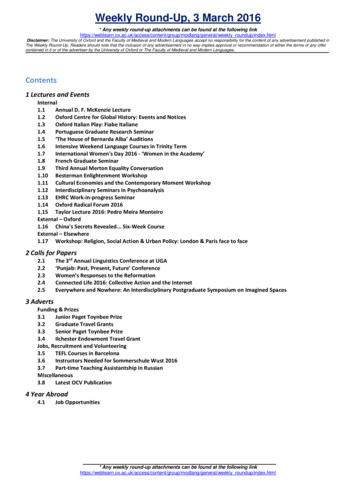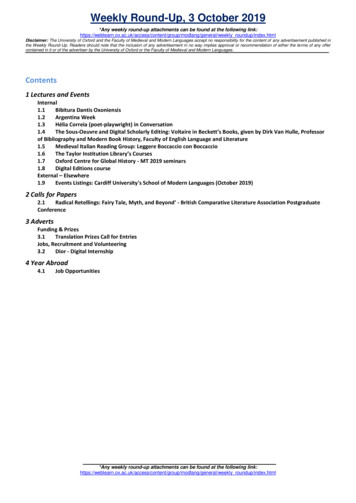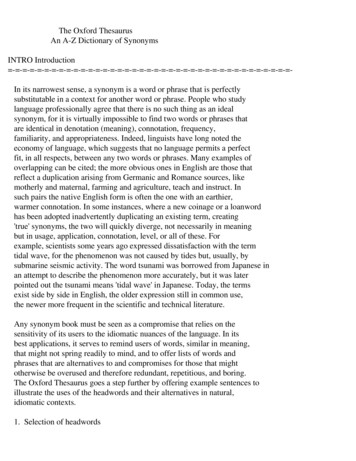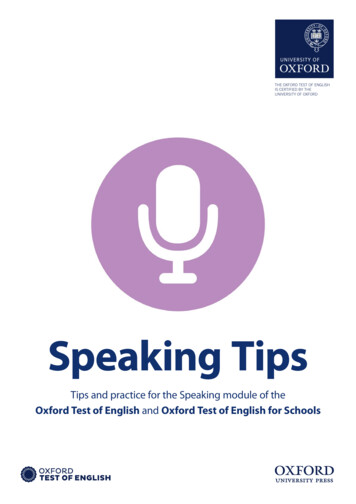
Transcription
THE OXFORD TEST OF ENGLISHIS CERTIFIED BY THEUNIVERSITY OF OXFORDSpeaking TipsSpeaking TipsTips and practice for the Speaking module of theOxford Test of English and Oxford Test of English for Schools
ContentsIntroduction Test overview The Speaking module Tips for preparing for the Speaking module Part 1: InterviewExercise 1 Tip: Practise answering questions 1 and 2Exercise 2 Tip: Listen carefully for the topic of each setExercise 3Exercise 4 Exercise 5 Tip: Give reasons for your answersExercise 6Part 2: Voicemails Exercise 1 Tip: Make sure you answer all three promptsExercise 2 Tip: Try to use your own wordsExercise 3 Tip: Try to expand your responsesExercise 4 Exercise 5 Tip: Use the right level of formalityExercise 6Exercise 7 Part 3: TalkExercise 1 Tip: Make sure you answer the questionExercise 2 Tip: Organize your talkExercise 3 Exercise 4 Tip: Give reasons for each point you makeExercise 5Exercise 6 Tip: Use your preparation timeExercise 7 Part 4: Follow-up questions Exercise 1 Tip: Give reasons and examplesExercise 2 Exercise 3 Tip: Use a variety of phrasesExercise 4 Exercise 5 Tip: Always try to answer a questionExercise 6Speaking Tips at a glance DOs and DON’Ts for taking the Speaking module Answer Key Part 1Part 2 Part 3 Part 4 Speaking Tips at a glance DOs and DON’Ts for taking the Speaking module 2Oxford Test of English Speaking Tips3456e 7e 7e 8e 89e 9e 1011e 11e 13e 1414e 15e 1617e 18e 20222223e 24e 252627e 27272828e 29e 29303233e 333436394040Photocopiable Oxford University Press
IntroductionOxford Test of English Speaking Tips is designed to help you maximize your result for theSpeaking module of the Oxford Test of English and Oxford Test of English for Schools. Thereare four sections; one for each part of the test: Interview, Voicemails, Talk, and Follow-upquestions.Each section has advice (the ‘tips’) on how to answer the questions in the test, exercises tohelp you put the tips into practice, and sample questions with audio that you can answer.How to use Oxford Test of English Speaking TipsOxford Test of English Speaking Tips is designed to be used for self-study or with a teacherin class. Before you start using the tips, it’s a good idea to take the online demo. This willshow you what the test looks like, and give you an opportunity to practise interacting withthe system. You can access the demos here:Oxford Test of English demoOxford Test of English for Schools demoSelf-studyIf you are using Oxford Test of English Speaking Tips for self-study, then work your waythrough each tip, completing the exercises and checking your answers in the Answer Keyas you go.Classroom useIf you are a teacher using Oxford Test of English Speaking Tips with a class, you can workthrough each tip and exercise in order, and refer to the Answer Key for explanatorycomments. Take every opportunity for students to work together and practise answeringquestions. Ideas to do this include students working: through the exercises collaboratively (e.g. in pairs) through the exercises alone, and then comparing answers in pairs or groups in pairs; one asking questions, the other answering the questions in teams to create questions for other teams.Further practiceFor further practice, the following books are available:Oxford Test of English B1 Practice TestsOxford Test of English B2 Practice TestsOxford Test of English Speaking TipsPhotocopiable Oxford University Press3
Test overviewThe Oxford Test of English is for adult learners of English (aged 16 and over) at B2, B1, andA2 levels of the Common European Framework of Reference for Languages (CEFR) andis certified by the University of Oxford. It tests your ability to communicate in English in arange of educational, professional, and social settings. The test takes approximately twohours.The Oxford Test of English is a computer-based test. It consists of four modules: Speaking,Listening, Reading, and Writing. You can take the whole test (all four modules), a singlemodule, or any combination of the four modules. The test uses a bank of questions foreach module so that during one test session, each test taker gets a different version of thetest. The Listening and Reading modules are adaptive, which means that the questionsget easier or more difficult depending on whether you answer them correctly or not. Thisallows the computer to accurately assess your level of English. The Speaking and Writingmodules are marked by trained English language assessors.The Oxford Test of English for Schools is for 12- to 16-year-olds and is identical to theOxford Test of English, except that the topics in the test are more suited to the age group.If you take all four modules, you will receive a certificate. If you take three modules orfewer, you will receive a module report card. The results can be used to show employersand universities your level of proficiency in English according to the CEFR levels. You canfind a list of test centres where you can take the test at www.oxfordtestofenglish.com. Thecertificate for Oxford Test of English and Oxford Test of English for Schools is the same.ModuleSpeakingListeningReadingWriting4PartNo. tasksNo. itemsStructureTimingPart 126 ( 2Interview: eight spoken questions on everyday topicsunassessed)Part 222Two voicemails with spoken and written inputPart 311A talk on an issue or scenario, with spoken and writteninput and picture promptsPart 416Six spoken questions related to the theme of the Part 3 talkPart 155Five discrete short monologues/dialogues with pictureoptions, each with one questionPart 215A longer monologue with a note-completion taskPart 315A longer dialogue with a task focusing on identifyingopinionsPart 455Five discrete short monologues/dialogues with textoptions, each with one questionPart 166Six short texts from a variety of sources, each with onequestionPart 216Six texts, profiling people, are matched to four descriptionsORSix items are matched to three profiles of peoplePart 316Six extracted sentences are inserted into a longer textPart 414A longer text with four questionsPart 111Email (80–130 words)Part 211Essay (100–160 words)ORMagazine article or Review (100–160 words)Oxford Test of English Speaking TipsApprox.15 minutesApprox.30 minutes35 minutes45 minutesPhotocopiable Oxford University Press
The Speaking moduleThe Speaking module has four parts: Interview, Voicemail, Talk, and Follow-up questions,and takes approximately 15 minutes. You will hear all the questions. The audio is playedonly once. For the Voicemails and Talk, the questions will also appear on the screen. Youranswers to the questions are recorded. The recordings will be marked by a trained assessor,so please speak clearly into the microphone. For each question, a clock shows how muchtime you have to answer. The Speaking module moves from one question to the nextautomatically. You cannot return to a question after the time runs out.For more information about the test, make sure you check outOxford Test of English: A Guide for Test Takers.PartStructureTesting focusInterviewEight questions on everyday topicsQuestions 1 and 2: Talk for ten seconds per questionQuestions 3–8: Talk for twenty seconds per question responding to questions giving factual information expressing personal opinionsVoicemailTalk for forty seconds per voicemailTwenty seconds’ preparation timeVoicemail 1: Leave a voicemailVoicemail 2: Reply to a voicemail organizing longer speech speaking formally,3TalkShort talkChoose two of four photos to talk aboutThirty seconds’ preparation timeTalk for sixty seconds 4Follow-up questionsSix questions on the topic of the Part 3 talkTalk for thirty seconds per questionAs for Part 3 and including: responding to questions expressing, justifying, andresponding to opinions expressing feelings agreeing and disagreeing12on everyday topicssemi‑formally or informallyorganizing longer speechdescribingcomparing and contrastingspeculatingsuggestingDuring the testYou will need to wear the headphones provided during the Speaking module. Youwill complete an audio check before the test starts to make sure the headphones andmicrophone provided by the test centre are working properly. You should speak clearly at anormal level into the microphone. You can change the volume during the test. During theSpeaking module, other test takers in the room will be speaking at the same time as you.There may also be some background noise, which the headphones will reduce.Oxford Test of English Speaking TipsPhotocopiable Oxford University Press5
Tips for preparing for theSpeaking module1 Make a plan Find a ‘study buddy’ – another English learner who you can practise with. Make a weekly schedule of when you will practise.2 Make sure you know what to expect Take the demo so that you know what it’s like to take the test on a computer. Do practice tests so that you get used to the different kinds of questions in the test.3 Practise, practise, practise! Record yourself speaking in English. Listen to the recording and think about how youcould improve what you say, e.g. using a wider range of vocabulary and grammar,correcting your mistakes, speaking more clearly. Use a clock to time yourself answering the questions in the Speaking Tips. Keepdoing this until you are comfortable talking for the same amount of time as you willbe given to answer in the actual test. When you practise English, sometimes you should focus on speaking fluently andnot worry about making mistakes. At other times, you should focus more on usingEnglish correctly. Think of a lot of questions someone could ask you about yourself and write themdown. Ask your ‘study buddy’ to ask you the questions and practise answering them. Learn and practise words and phrases you can use when you leave a voicemailmessage, e.g. This is a message for . Would it be possible to ? Learn and practise words and phrases you can use when you discuss something,e.g. I don’t really agree with this. It seems to me that .4 Use English whenever you can Always try to speak in English to your English teacher and to the other students inyour English class. Try to find people outside school who you can practise speaking English with, e.g.relatives, friends, or tourists. Arrange to speak by telephone or over the Internet. Try watching films in English or with English subtitles. Listening to podcasts and audiobooks in English can help your speaking. Try pausingthe recordings and repeating sentences or parts of sentences.6Oxford Test of English Speaking TipsPhotocopiable Oxford University Press
Speaking Part 1: InterviewIn Speaking Part 1, you will answer eight questions. You will hear the questions, but theywill not show on the screen, so you need to listen carefully. Questions 1 and 2 are practice questions, so they are not assessed. These questionsalways ask you your name and which country you are from. Questions 3, 4 and 5 are a set about a particular topic, and you have 20 seconds toanswer each question. Questions 6, 7 and 8 are another set about a different topic, and you have 20 seconds toanswer each question.All the interview questions are about you and your everyday life.Here are some examples of questions you might be asked in Part 1.1 What’s your name?e 1.02 2 Which country do you come from?e 1.03 3 I’m going to ask you some questions about learning languages. Can youdescribe an English lesson that you really enjoyed?e 1.04 4 Tell me what you do to practise English outside the classroom.e 1.05 5 What other languages apart from English would you like to learn?e 1.06 6 I’m going to ask you some questions about travel. Can you describe ajourney you make regularly?e 1.07 7 Have you ever travelled to other countries?e 1.08 8 Tell me about a place you would like to visit.e 1.01Tip: Practise answering questions 1 and 2You will not be marked on these questions. The questions are to helpyou relax at the start of the test. You only have ten seconds to answerquestion one and ten seconds to answer question two, so you don’t needto give long answers. If you practise answering these questions, they willhelp you feel confident.Exercise 1Read the Interview questions and the responses from a student, José. Then practiseanswering the questions yourself.e 1.09! What’s your name?My name’s José Garcia.e 1.10@ Which country do you come from?JoséI’m from a small village outsideMadrid in Spain.Oxford Test of English Speaking TipsPhotocopiable Oxford University Press7
Tip: Listen carefully for the topic of each set of threequestionsEach set of three questions begins with the phrase ‘I’m going to ask yousome questions about ’ plus the topic. For example, ‘I’m going to ask yousome questions about your free time.’ Listen carefully for the topic for eachset of questions – this will help you understand each of the three questions.Exercise 2Read the sets of questions below. Complete the gaps.Set 1e 1.11e 1.12e 1.13Set 2e 1.14e 1.15e 1.16Set 3e 1.17e 1.18e 1.19I’m going to ask you some questions about . Can you describe something you have read that you really enjoyed? Do you prefer reading e-books or reading real books? What things can you do to improve your reading in English?I’m going to ask you some questions about . What did you do on your last holiday? Which would you prefer: one long holiday each year or a lot of shortholidays? Where would you like to go on holiday in the future?I’m going to ask you some questions about . What do you like doing with your friends? Tell me how you met your best friend. When do you prefer to be with friends, and when do you prefer to bewith your family?Check your answers with the Answer Key on p.33.Exercise 3The focus of each question is different. For example, ‘What did you do on your last holiday?’focuses on events in the past, while ‘Which would you prefer: one long holiday each year ora lot of short holidays?’ focuses on preferences.Make sure your answers to each question are different to show that you can use a range ofgrammar and vocabulary.Write a set of questions for each of the following topics. Remember that the questionsshould all have a different focus, such as different times (past, present, future), preferences,comparing things, etc.Set 1e 1.20e 1.21e 1.22Set 2e 1.23e 1.24e 1.25I’m going to ask you some questions about your family. I’m going to ask you some questions about sport. Check your answers with the Answer Key on p.33 or with the audio.8Oxford Test of English Speaking TipsPhotocopiable Oxford University Press
Exercise 4Practise answering the questions in Exercise 2 and the questions you wrote in Exercise 3.Try to time yourself answering the questions.Tip: Give reasons for your answersWhen you answer a question, try to give reasons for your answer. This willhelp you to give longer answers which will help you show the range ofyour grammar and vocabulary.Exercise 5Read the Interview questions and the responses from a student, Basha. What could Bashado to improve her answers?e 1.26 What do you like doing withyour friends?Sometimes at the weekend Iplay tennis with my friends. Also,we go shopping together. I liketalking with my friends and goingto the cinema.e 1.27 Tell me how you metyour best friend.BashaMy best friend is Jim. We firstmet at primary school.e 1.28% When do you prefer to be with friends, andwhen do you prefer to be with your family?I prefer to be with friends atthe weekend. In the week,I prefer to be with my family.Check your answers with the Answer Key on p.33.Oxford Test of English Speaking TipsPhotocopiable Oxford University Press9
Exercise 6Practise answering these questions. Remember these tips:Tip: Practise answering questions 1 and 2Tip: Listen carefully for the topic of each set of three questionsTip: Give reasons for your answers1 What’s your name?e 1.30 2 Which country do you come from?e 1.31 3 I’m going to ask you some questions about festivals and celebrations. Howdo people celebrate birthdays in your country?e 1.32 4 Can you describe a present someone gave you that you really liked?e 1.33 5 Tell me about an important national holiday in your country.e 1.34 6 I’m going to ask you some questions about your free time. Do you prefer tospend your free time alone, or do you prefer to spend your free time withother people?e 1.35 7 Do you think you have enough free time?e 1.36 8 What did you do last weekend?e 1.2910Oxford Test of English Speaking TipsPhotocopiable Oxford University Press
Speaking Part 2 – VoicemailsAbout Speaking Part 2In Speaking Part 2, you will do two tasks: Voicemail 1 and Voicemail 2. The tasks alwaysinclude a situation and three bullet point prompts. You talk for 40 seconds. You have20 seconds’ preparation time. Here’s an example of a Voicemail 1 task:SituationPrompt 1Prompt 2Prompt 3You heard an interview on the radio with the organizer of a club which helps to keepyour local area clean. You would like to join the club. Leave a voicemail message for theclub organizer and: explain why you want to join the club ask some questions about the club say how you could help.For Voicemail 2, there is also audio input which you will only hear.SituationPrompt 1Prompt 2Prompt 3Audio inputListen to the message from your friend about a free course she has won as a prize. Then,leave a voicemail message for your friend. In your message you should: congratulate your friend ask some questions about the course say what you think your friend should do.Now listen to the message.Hi. It’s Anya here. I’ve won a prize in a competition. It’s a three-week English course nextsummer, with everything paid. It sounds great, but the problem is it’s at the same time asmy family holiday by the seaside. I’m not sure what to do. What do you think? Tip: Make sure you answer all three prompts in yourresponseThink about the situation and make sure you understand the three thingsyou need to include in your voicemail message.Exercise 1Read this Oxford Test of English Voicemail 1 task and the responses from two students, Erikand Anna. As you read their responses, think about the following questions:1 Which person gives a better response?2 Why is it better?Oxford Test of English Speaking TipsPhotocopiable Oxford University Press11
e 2.01You have an appointment with a dentist this afternoon but you cannot go tothe appointment. Leave a voicemail message for the dentist and: explain who you are say why you cannot go to the appointment suggest a time for another appointment.Good morning. I would like to speak to Dr Smith aboutan appointment to check my teeth. My name is Erik. Ihave a very bad toothache. It started two days ago andit is getting worse and worse. Please can you give me anappointment for tomorrow morning, as early as possible?Please call me back on this number. Thank you. Bye.ErikHello. This is a message for my dentist, Dr Smith. My name is AnnaBandura and I have an appointment with you for this afternoonat 2.30 p.m. I’m afraid I need to cancel the appointment because Ihave to attend a meeting at work that I didn’t know about whenI arranged the appointment. I’m sorry about this. Could I haveanother appointment for later this week? Is Friday afternoon atfour o’clock possible for you? Please call me back to let me know.Thank you.AnnaCheck your answers with the Answer Key on p.34.12Oxford Test of English Speaking TipsPhotocopiable Oxford University Press
Tip: Try to use your own wordsWhen you answer a question, you should try to use your own words andavoid repeating parts of the question as much as possible. If you copy toomany words from the question, you will show less of the grammar andvocabulary that you know. Sometimes you can’t avoid copying individualwords, but you should avoid copying phrases. For example, when youanswer the following Voicemail in Exercise 2, it is fine to use the words ‘bag’and ‘library’, but don’t say ‘I think I left my bag in the library’, as that is toosimilar to the wording in the question: ‘You think you left your bag in thelibrary.’Exercise 2Read this Voicemail 1 task and the responses from two students, Peter and Alice. Highlightwords in their responses which are copied from the task. Then decide which answer is better.e 2.02 You recently went to a library. You think you left your bag in the library. Leavea voicemail message for the library manager and: explain who you are describe your bag and what’s in it say what you would like the library manager to do.Hello. My name’s Peter Horvat. I was studying in the librarythis morning. When I got home I realised I didn’t have myrucksack. It’s black with yellow straps. Inside there are twonotebooks with my name on. Please could you ring me onthis number if anyone has found it? Thanks.PeterHello. My name’s Alice Cho. I recently went to your library andI think I left my bag in the library. My bag is blue and there aresome books in it. I would like the library manager to keep mybag in the reception. Thank you.AliceCheck your answers with the Answer Key on p.34.Oxford Test of English Speaking TipsPhotocopiable Oxford University Press13
Tip: Try to expand your responsesIf your answer is short, you won’t show the range of your grammar andvocabulary. Try to expand (give longer) answers to show how good yourEnglish is. For example, if one of the prompts is ‘ask some questions ’ ,you should ask at least two questions. Remember that you have 40seconds to give your response, so try to speak for as much of this time aspossible.Exercise 3Read this Voicemail 2 task and the responses from two students, Samir and Clara. Whichresponse is better?e 2.03 Listen to the message from your friend about a free course she has won as aprize. Then, leave a voicemail message for your friend. In your message you should: congratulate your friend ask some questions about the course say what you think your friend should do.Now listen to the message.Hi. It’s Anya here. I’ve won a prize in a competition. It’s a three-week English course nextsummer, with everything paid. It sounds great, but the problem is it’s at the same time asmy family holiday by the seaside. I’m not sure what to do. What do you think?Hi Anya. This is Samir. That’s fantastic news.Congratulations! Where’s the course going to be? Canyou change the course dates? I think it’s a brilliantopportunity, so why don’t you ask your parents to changethe dates of the family holiday? Then you can do both.Hope this helps. Bye.SamirHi Anya. Congratulations! Where is thecourse going to take place? I think youshould do the course. Bye.Check your answers with the Answer Key on p.34.ClaraExercise 4Improve Clara’s response by expanding it.Compare what you’ve written with the model answer on p.35.14Oxford Test of English Speaking TipsPhotocopiable Oxford University Press
Tip: Use the right level of formalityFor Oxford Test of English Voicemail 1, you will be leaving a message fromsomeone you have never met, or that is in a position of authority, so youwill need to use neutral or formal language.For Oxford Test of English for Schools Voicemail 1, you will be leavinga message for someone you know, so you will need to use neutral orinformal language.For Oxford Test of English Voicemail 2 and Oxford Test of English forSchools Voicemail 2, you will be leaving a message for a friend, familymember, or someone you know well, so you will need to use informallanguage.Exercise 5Read this Oxford Test of English Voicemail 1 task and the responses from two students, Iremand Roberto. Which response is better? Why?e 2.04 You have booked an English study holiday in another country. However, youare now unable to go. Leave a voicemail message for the course manager and: give details of the study holiday you booked explain why you are unable to go on the study holiday say what you want the manager to do.Hi. I can’t make it to the study holiday Ibooked for next June – I’ve found a new jobso need to do that – so I want my moneyback. Can you sort that out for me? Cheers!IremHello. My name’s Roberto Romano. I booked an English courseat your college for the first week of June. I’m afraid I can nolonger come as I have a family issue I need to take care of.I understand that I am giving you enough notice for a fullrefund, so could you arrange this? I would appreciate it if youcould call me back on this number.RobertoCheck your answers with the Answer Key on p.35.Oxford Test of English Speaking TipsPhotocopiable Oxford University Press15
Exercise 6In this exercise, you will focus on all the tips for the Voicemail tasks. Read the followingVoicemail 1 task and the responses from two students, Paolo and Olivia.e 2.05 You heard an interview on the radio with the organizer of a club which helpsto keep your local area clean. You would like to join the club. Leave a voicemail messagefor the club organizer and: explain why you want to join the club ask some questions about the club say how you could help.Hi. My name’s Paolo Alvarez. I heard you talking aboutthe environment club on the radio today and I’m reallyinterested in becoming a member. I’m a big believer in theenvironment and want to do what I can to protect it. Youdidn’t mention how old you have to be to join the club.I’m only 15 – am I old enough to join? I think I could reallyhelp out by collecting litter in our local park, or plantingsome flowers. Let me know what you think!PaoloHi. It’s Olivia. I heard an interview on the radio about aclub which helps to keep my local area clean and I wannajoin the club because I like my local area. I also wanna asksome questions about the club. How many people are therein the club and when do you meet? Give us a ring on thisnumber and let me know. Bye.OliviaTick (f) the correct box or boxes for each question.Which student ?PaoloOlivia1 didn’t respond to all the prompts2 didn’t use their own words3 didn’t expand all their answers4 didn’t use the right level of formalityCheck your answers with the Answer Key on p.35.16Oxford Test of English Speaking TipsPhotocopiable Oxford University Press
Exercise 7Rewrite Paolo and Olivia’s responses and try to improve them by making sure they respondto all the prompts, expand their responses, and use their own words. Ask a teacher to checkyour ideas.PaoloOliviaOxford Test of English Speaking TipsPhotocopiable Oxford University Press17
Speaking Part 3: TalkIn Speaking Part 3, you will give a talk for one minute. The task will give a situation or anissue and four photographs which show different ideas. You will choose two photographsand talk about the ideas shown in the photographs. You have 30 seconds to think aboutwhat you want to say before you start talking.Here’s an example of a situation task:e 3.01 Your English school is planning to have an activity for its new students toget to know each other. The school has asked you for ideas.Choose two photographs. Tell your class about the advantages and disadvantagesof these two activities.Restaurant mealSports dayCountry walkDiscoYou now have 30 seconds to think about what you want to say.18Oxford Test of English Speaking TipsPhotocopiable Oxford University Press
Here is an example of an issue task:e 3.02 You are going to give a talk to your English class about things that areimportant for a good life.Choose two photographs. Tell your class why these two things are important for agood life.HealthFriendsEducationMoneyYou now have 30 seconds to think about what you want to say.Oxford Test of English Speaking TipsPhotocopiable Oxford University Press19
Tip: Make sure you answer the questionDon’t just talk about the topic in general – you need to answer thequestion you are asked. The question is written in a way that will help youto show your ability to organize your thoughts. Don’t memorize a speechbefore the test – this won’t answer the question and you will lose marks.Exercise 1Read this Talk task and the responses from two students, Juliana and Afonso. As you readthe responses, think about the following questions: Which student gives a better response? Why is it better?e 3.03 You are going to give a talk to your English class about different placeswhere people live.Choose two photographs. Tell your class what the advantages and disadvantagesof living in these different places might be.ApartmentCottageHouseboatMotorhomeYou now have 30 seconds to think about what you want to say.20Oxford Test of English Speaking TipsPhotocopiable Oxford University Press
Hello. I’m going to talk about the advantages anddisadvantages of living in apartments and mobile homes.Nowadays, many people live in apartments because theyare much cheaper than houses, and there are plenty ofapartments available. On the other hand, there are a lotof problems with apartments; for example, they can benoisy as you have neighbours in all directions. Comparedto apartments, motorhomes are more fun and are a greatway to see the world. However, motorhomes lack thingslike washing machines and a proper toilet, which meansthey are not a realistic option for living in for the long term.JulianaI think cities are the best places to live in. In a city, you areusually near shops, public transport, schools, workplaces,cafes, cinemas, and other things we use. City centreapartments can be good places to live, but I prefer townhouses. Actually, I live in a town house and we have plentyof room inside the house and also a nice garden. I wouldn’tlike to live in a country cottage. It’s too far from otherpeople. It’s too quiet for me. I would stay in a motorhome onholiday, but I wouldn’t like to live there normally.AfonsoCheck your answers with the Answer Key on p.36.Oxford Test of English Speaking TipsPhotocopiable Oxford University Press21
Tip: Organize your talkOrganizing your talk well will help to improve your mark. One way toorganize your talk is to use the four-stage approach
6 Oxford Test of English Speaking Tips Photocopiable O xford niversity Press Tips for preparing for the Speaking module 1 Make a plan Find a ‘study buddy’ – another English learner who you can practise with. Make a weekly schedule of when you will practise. 2 Make sure you know what to expect Take the demo so tha

